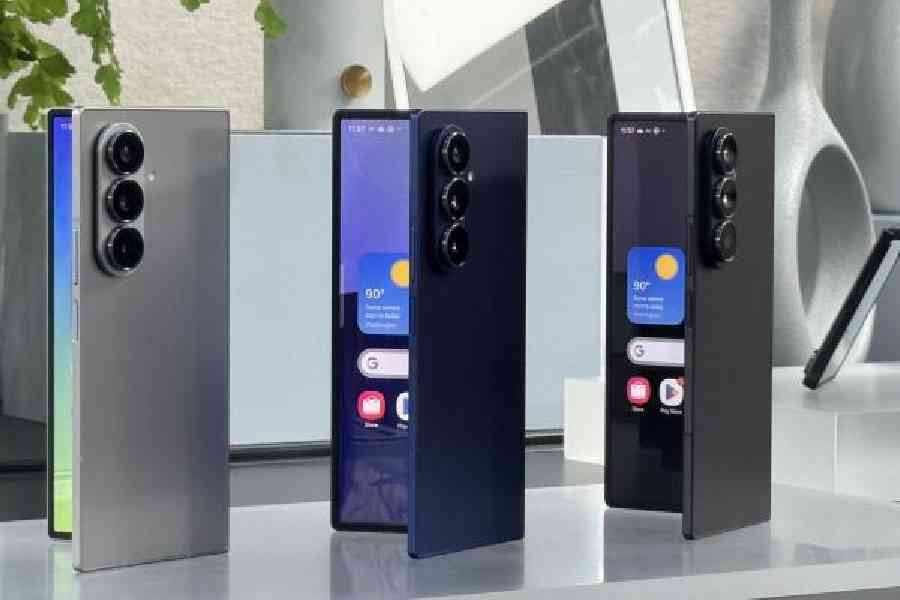What difference can a generation make in the tech world? There’s something to learn from Samsung’s latest Galaxy Z Fold7 and Galaxy Z Flip7 foldable phones. The updates on the hardware front are drastic and so are the changes that are coming with One UI 8 based on Android 16.
We have already reported on the changes in the hardware department. But what about the software? As always, Samsung has collaborated with Google to bring some pleasant updates. This also demonstrates how multimodal and integrated AI experiences have evolved from concept to reality.

Galaxy Z Flip7 comes with a number of AI features
“Galaxy Z Fold7 combines Galaxy AI with powerful hardware to deliver our most advanced smartphone experience yet,” said TM Roh, president and acting head of the device experience (DX) division at Samsung Electronics. “This next chapter of foldables brings together design and engineering, with AI built specifically for the foldable form. It gives people the ultra experience they want — powerful, immersive, intelligent, and portable all in one.”
New AI chops
Among the many new AI features you can experience with the new devices is an extension to Circle to Search. It is getting even more powerful. Now, with Circle to Search, gaming tips appear when and where you need them. Just circle an item on screen and get results, tips, or tactics in a floating view that ensures a smooth, uninterrupted experience. It will give you an edge during intense gaming sessions.
One UI 8 takes the help of AI to combine large-screen multitasking with intelligent tools that understand what users type, say and even see. Further, with an AI-powered camera and privacy built into every layer, Galaxy Z Fold7 becomes a smart personal assistant, ready to help anytime.
Gemini, which is becoming a buzzword, gets stronger. Gemini Live is now enhanced with multimodal AI that understands what users see, say and do, making it possible to type or speak contextual questions and get answers without having to toggle back and forth between apps. There is screen sharing on Gemini Live or camera sharing on Gemini Live, so you can simply show Gemini what users are looking at on the screen or on the camera, then ask questions to get instant insights.
With Galaxy AI Optimized for Large Screens, Galaxy Z Fold7 delivers experiences that maximize the benefits of the expansive foldable display to boost productivity.

(Left to right) Jisun Park, Mindy Brooks and Vinesh Sukumar
AI Results View displays results from AI features in a separate Split View or in a Floating View, so the user’s original content remains unobstructed and visible. Users can be more efficient with Drag & Drop AI-generated content, including images and text, directly from Multi Window. With tools like Drawing Assist or Writing Assist, it’s easier than ever to move ideas and visuals, enabling a smoother creative process.
Figuring out AI
What Samsung is trying to achieve is meaningful implementation of AI and that was felt at a panel discussion that was held a day after the launch to talk about the next frontier of AI: Ambient Intelligence, with panelists from Samsung, Google and Qualcomm sharing their thoughts on the power of platform integration.
“In January, Samsung demonstrated where it’s headed with AI goals. With Galaxy S25, we could build an integrated AI and also incorporate an intuitive AI, centred around user experience. It brought in personalisation and at the same time, highlighted user privacy,” said Jisun Park, corporate executive vice-president and head of language AI team, mobile experience business at Samsung Electronics.
Samsung highlighted the growing use of Galaxy AI in the last year as well as its ambitions and commitment looking ahead. The company wants to democratize Galaxy AI to 400 million devices by the end of the year. Already, Galaxy AI is being used by more than 70 per cent of Galaxy S25 users.
Here’s more: Circle to Search with Google is used by more than half (54 per cent) of S25 users. Photo Assist use among S25 users has nearly doubled (26 per cent) compared to Galaxy S24 users (13.4 per cent). And Now Brief is used by one in three (32 per cent) S25 users.
“Some see AI as the start of a ‘post smartphone’ era, but we see it differently. The smartphone is becoming even more central to an ambient AI experience. Where AI is so seamlessly integrated into our daily lives that it becomes almost invisible and second nature. We’re building a future where your devices don’t just respond, they become smarter to anticipate, see, and work quietly in the background to make life feel a little more effortless. That’s the level of simplicity and efficiency we want to provide our users, and it starts with the device that’s always in your hand: your phone,” said Park.
Also present was Mindy Brooks, vice-president, Android consumer product and experience, Google, which works closely with Samsung.
Brooks said: “Through close collaboration with Samsung, Gemini works seamlessly across their devices and connects with their first-party apps to provide helpful and personalised responses. For example, Gemini’s live video capabilities have been optimised for the Flip’s front screen camera, and Gemini on Galaxy Watch leverages context from your phone. When it comes to building more agentic AI, our priority is to ensure we’re fostering smarter, more personalised, and more meaningful assistance across our device ecosystem.”

An AI feature in action on Galaxy Z Fold7
On the security front, One UI 8 is bringing enhanced privacy to personalised AI experiences with the new Knox Enhanced Encrypted Protection (KEEP). It creates encrypted, app-specific storage environments within the device’s secure storage area, ensuring each app can access only its own sensitive information and nothing more. Also, as part of its ongoing commitment to quantum-safe security, Samsung is integrating post-quantum cryptography into Secure Wi-Fi. It secures the key exchange process at the core of encrypted connections, helping ensure robust privacy even over public networks.
Vinesh Sukumar, vice-president of product management, Qualcomm Technologies, said: “As AI becomes more personalised, there’s more information than ever to protect. We believe that trust is the foundation of personalised AI and for us, that trust is earned at the hardware level. Our work with Samsung prioritises secure, on-device intelligence so that users always know where their data is and who controls it. For us, privacy, performance, and personalisation go hand in hand – they’re not competing priorities, but co-equal standards. Our goal is to help people embrace AI with confidence, not concern.”
In the last year, Samsung has commissioned ongoing research to bring to the surface the perceptions, attitudes and behaviours that shape consumers’ relationship with mobile AI, now and in the future.
In January 2025, Samsung-commissioned research identified key motivators and barriers surrounding mobile AI that existed among consumers globally and across 10 individual countries.
Using voice commands more often than typing to get things done is an evolving aspect. Here’s the breakdown from the research: Global 45 per cent, India 14 per cent, the UK 45 per cent, the US 40 per cent and South Korea 27 per cent.










